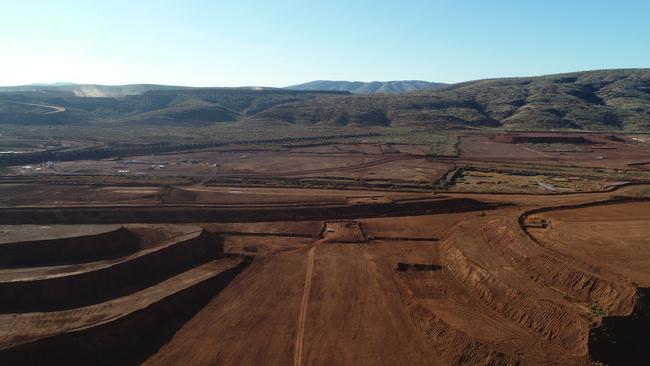BHP says its WA iron ore operations hit production records amid iron ore price surge
BHP expects China’s moratorium on Australian coal will last for years, even as its iron ore demand drives record Pilbara production.

BHP says it expects China’s bans on Australian coal to last “for a number of years” as its iron ore division cashed in on the strength of Chinese demand for iron ore, with its Pilbara operations hitting new production records.
BHP’s flagship Pilbara iron ore division hit new production records as the price surged in the first half of the year, with the company exporting 139.7 million tonnes in the first half of 2021 as prices hit their highest levels since the boom.
The company’s Pilbara mines shipped 283.9 million tonnes for the full financial year, marginally above the 283.3 million tonnes from the previous year, after exporting 73.7 million tonnes for the June quarter.
That figure was well down on the 77 million tonnes from the equivalent period in 2020, however, with BHP citing bad weather and WA’s tight labour market – which affected its rail operations – for the drop.
BHP boss Mike Henry said the company had achieved record production at its iron ore operations for the full financial year of 284.1 million tonnes, with the average received price for the period of $US158.15 a tonne up 52 per cent compared to the first half of the year – and, in an excellent sign for its August financial results, well ahead of the $US154.90 a tonne achieved by Rio Tinto in the same period.
“We achieved production records at our Western Australia Iron Ore operations and the Goonyella Riverside metallurgical coal mine in Queensland. We maintained all-time high concentrator throughput at our Escondida copper mine in Chile,” he said.
“Olympic Dam in South Australia had its highest annual copper production since BHP acquired the asset in 2005, and its best-ever gold production.”
BHP said it expected iron ore costs to come in within the $US13 to $US14 tonne range last tipped in January – although that guidance assumed a US70c exchange rate.
BHP had said it expected to produce 276 to 286 million tonnes of iron ore from its Pilbara mines last financial year, upgrading the guidance in April to suggest it would fall in the upper end of the range.
The company’s March quarter report said it had shipped 66 million tonnes of iron ore in the quarter, and 210.2 million tonnes in the nine months to the end of the period, up about 2 per cent on the previous year.
BHP shipped 139.7 million tonnes in the first half of 2021, compared to Rio, which last week reported it had exported 154.1 million tonnes after another poor June quarter.
The company said it had also achieved the best output at Olympic Dam since it acquired often-troubled operations in 2005, at 205,300 tonnes of copper for the full year and 50,800 tonnes for the quarter.
BHP says it expects production of 278 to 288 million tonnes in the current financial year, as it ramps up its newly opened South Flank mine – an 80 million tonne a year hub that is also expected to eventually lift its average shipment grades from 61 per cent to 62 per cent iron, and vastly improve the proportion of valuable lump product its sells into the market.
But the resources giant warned it expected troubles in the coal market, the result of tensions between Beijing and Canberra, to remain for some time with prices for both coking and thermal coal still suffering the impact of China’s bans on Australian coal.
“We expect restrictions on coal imports into China to remain for a number of years,” the company said.
BHP’s Queensland coking coal operations produced 21.1 million tonnes for the June quarter, and 72.5 million tonnes for the year, in line with the previous financial year.
BHP has managed to reroute the bulk of the coking coal it would once have sold into Chinese steel mills to other markets, but the impact of China’s bans on Australian coal are still having an impact on prices, despite a recent resurgence in prices for both coking and thermal coal.
Average realised prices for the full year were sharply down for the full year, with BHP sellingits coking coal for an average $US106.64 a tonne last financial year, down from $US130.97 the previous year.
It averaged a price of $US114.81 in the first half of 2021.
Thermal coal price rose sharply in the June half, however, up 60 per cent compared to the first half of the financial year, to $US70.83.
BHP has already cut a deal to sell its interest in the Cerrejón coal mine in Colombia and is trying to find a buyer for its Mt Arthur mine in NSW.
Production at Mt Arthur fell sharply for the full year, down 11 per cent to 14.3 million tonnes, as BHP maintained its strategy of seeking high grade tonnes from the ageing mine.
BHP shares closed down $1.26 to $49.24 on Tuesday.


To join the conversation, please log in. Don't have an account? Register
Join the conversation, you are commenting as Logout